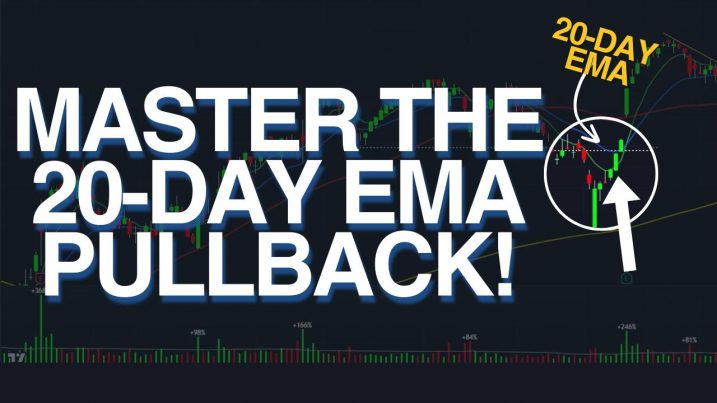
Missed the initial breakout? Don’t worry – there’s still a chance to catch that rocket! Today, we’re diving deep into a powerful strategy that could be your golden ticket to riding stocks showing massive strength, even after they’ve already launched.
In the ever-evolving world of swing trading, timing is everything. But what if I told you there’s a way to hop on board a strong uptrend, even if you’ve missed the initial breakout? That’s exactly what we’re going to explore today in Part 2 of our series on Mastering Pullbacks to the 20-day EMA.
In this post, we’ll break down a slightly different version of our 20-day EMA pullback strategy. While our previous discussion focused on entering after an obvious breakout to new highs, today we’re zeroing in on that first pullback to the 20-day EMA after a strong thrust off the lows.
To guide us through this powerful technique, we have Rick Pedicelli, our expert with over two decades of swing trading experience. Let’s dive in!
The Strategy: Catching the Post-Thrust Pullback
Identifying the Shakeout
The first step in this strategy is to identify a shakeout. What’s a shakeout, you ask? It’s a situation where a strong stock in a solid uptrend gets hit hard for a few weeks, effectively “shaking out” weak hands.
Rick walked us through a perfect example using the stock SE. Here’s what to look for:
- An uptrend line break
- Confirmation of that break
- Loss of support
- A sharp sell-off, often breaking below key moving averages
In SE’s case, we saw a nasty sell-off resulting in a near 30% correction. This is the kind of move that scares off most traders – and that’s exactly what we’re looking to capitalize on.
The Sharp Recovery
After the shakeout comes the critical part: a sharp recovery. In SE’s case, we saw a quick reversal that gapped through the 50-day moving average and took out the prior high. This sharp move off the lows is crucial – it’s what signals that it’s “go time.”
The Pullback: Your Entry Opportunity
Now comes the part we’ve all been waiting for – the pullback. What we’re typically looking for is a two to four-week pullback where the price action is mostly constructive. Here’s what to watch for:
- Price finding support near the 20-day EMA
- Coincidence with a touch of the prior base high
3, Mostly constructive price action (though a day or two of higher volume is okay.
Entry Points and Stop Placement
As the pullback progresses, we’re looking for the price action to tighten up around the 20-day EMA. This is where things get exciting. Rick suggests a few potential entry points:
- Above a key reversal candle
- During the chop as price action tightens
- On a small gap up after a downtrend line break
For stop placement, Rick recommends putting it beneath the swing low. This gives the trade room to breathe while still protecting your capital.
Trade Management and Exit Strategies
Once you’re in the trade, it’s all about managing your position and knowing when to take profits. In the SE example, the stock moved up about 20% in a few weeks. Rick suggests two potential exit strategies:
1, Take the quick 20% gain and move on
2. Sell half into strength and hold the other half for a break of the 20-day EMA
Remember, there’s nothing wrong with taking profits when you have them. As the saying goes, “You can’t go broke taking a profit.”
The Secret Sauce: Market Context
Now, here’s the pro tip that can really supercharge your results: always consider the broader market context. This strategy works best when:
- The overall market is also in an uptrend
- Even better, when the market has also sold off and had a quick recovery
Ideally, you want to see your chosen stock outperforming the broader market by 2-3 times. For instance, if the NASDAQ recovers 10-15% off the lows, you want to see your stock up 50%.
Key Takeaways
- Look for stocks that have experienced a sharp shakeout followed by a quick recovery
- Wait for a pullback to the 20-day EMA over 2-4 weeks
- Enter as price action tightens around the 20-day EMA
- Place stops beneath the swing low
- Consider the broader market context for best results
Remember, this strategy is all about capitalizing on strong stocks that have shaken out weak hands. By waiting for the pullback, you’re getting a better entry point on a stock that’s already shown its strength.
Conclusion:
Mastering the 20-day EMA pullback after a strong thrust can be a game-changer for your swing trading. It allows you to hop on strong trends even if you’ve missed the initial breakout. As always, practice and experience will help you fine-tune your entries and exits.
Keep in mind that while this strategy can be powerful, it’s just one tool in your trading toolbox. Always do your due diligence, manage your risk, and never stop learning.
Happy trading, and remember – trade what you see, not what you think!
Don’t miss out – watch now!
<
Elevate your trading journey with Morpheus Trading and Rick Pedicelli’s wealth of experience.
If you found these insights valuable, hit that like button and subscribe for more in-depth analyses.
For precise entry and exit points on top swing trade setups, visit MorpheusTrading.com and join our MTG Tribe.
In trading, the learning never stops. Keep pushing, keep growing, and always trade with confidence.
And always remember, trade what you see, not what you think!
Sign up for The Wagner Daily PRO today and take the next step towards trading success.
Join the exclusive MTG tribe in uncovering potential profit opportunities with a proven swing trading strategy.
Thanks for joining us on this journey, and until next time, happy trading!
Stay Connected:
Stay Informed:
